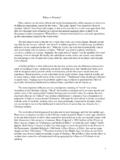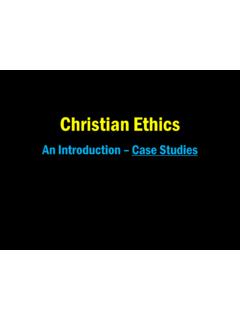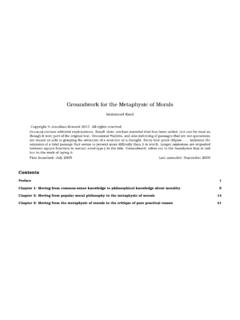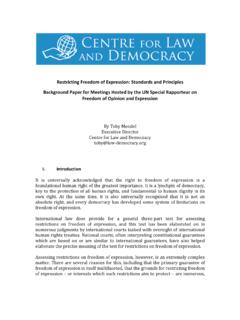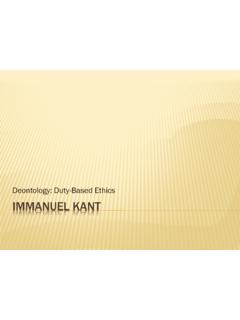Transcription of T W ESLEYAN ERITAGE IBRARY THEOLOGY - smcollege.edu
1 THE WESLEYAN HERITAGE LIBRARYTHEOLOGYTHEOLOGICAL INSTITUTESPART THIRDThe Morals of Christianityby Richard Watson. Follow peace with all men, and holiness, withoutwhich no man shall see the Lord Heb 12:14 Spreading Scriptural Holiness to the WorldWesleyan Heritage Publications 20022 THEOLOGICAL INSTITUTES:Or, a View of theEVIDENCES, DOCTRINES, MORALS, AND RICHARD NEW EDITION,WITH A COPIOUS INDEX, AND AN ANALYSISBY J. M IN TWO VOLUMES.(One Digital Volume - Ed.)TWENTY-SIXTH MORALS OF 1. THE moral LAWOF the law of God, as the subject of a Divine and adequately authenticatedrevelation, some observations were made in the first part of this work. Thatsuch a law exists, so communicated to mankind, and contained in the HolyScriptures; that we are under obligation to obey it as the declared willof our Creator and Lord; that this obligation is grounded upon ournatural relation to him as creatures made by his power, and dependentupon his bounty, are points which need not, therefore, be again advertedto, nor is it necessary to dwell upon the circumstances and degrees of itsmanifestation to men, under those former dispensations of the true religionwhich preceded Christianity.
2 We have exhibited the leading DOCTRINES ofthe Scriptures, as they are found in that perfected system of revealedreligion, which we owe to our Saviour, and to his apostles, who wroteunder the inspiration of that Holy Spirit whom he sent forth to lead theminto all truth; and we shall now find in the discourses of our Lord, and inthe apostolical writings, a system of moral principles, virtues, and duties,equalling in fulness and perfection that great body of DOCTRINAL TRUTH which is contained in the New Testament; and deriving from it its vitalinfluence and is, however, to be noticed, that the morals of the New Testament are notproposed to us in the form of a regular code. Even in the books of Moses,which have the legislative form to a great extent, all the principles andduties which constituted the full character of godliness, under thatdispensation, are not made the subjects of formal injunction by particularprecepts.
3 They are partly infolded in general principles, or often take theform of injunction in an apparently incidental manner, or are matters ofobvious inference. A preceding code of traditionary moral law is also allalong supposed in the writings of Moses and the prophets, as well as aconsuetudinary ritual and a doctrinal THEOLOGY ; both transmitted from thepatriarchs. This, too, is eminently the case with Christianity. It supposes4that all who believed in Christ admitted the Divine authority of the OldTestament; and it assumes the perpetual authority of its morals, as well asthe truth of its fundamental THEOLOGY . The constant allusions in the NewTestament to the moral rules of the Jews and patriarchs, either expressly asprecepts, or as the data of argument, sufficiently guard us against thenotion, that what has not in so many words been re-enacted by Christ andhis apostles is of no authority among Christians.
4 In a great number ofinstances, however, the form is directly preceptive, so as to have all theexplicitness and force of a regular code of law; and is, as much as a regularcode could be, a declaration of the sovereign will of Christ, enforced by thesanctions of eternal life and , however, is a point on which a few confirmatory observations may beusefully part of the preceding dispensation, designated generally by theappellation of THE LAW, is repealed in the New Testament, but what isobviously ceremonial, typical, and incapable of co-existing withChristianity. Our Lord, in his discourse with the Samaritan woman,declares, that the hour of the abolition of the temple worship was come;the Apostle Paul, in the Epistle to the Hebrews, teaches us that theLevitical services were but shadows, the substance and end of which isChrist, and the ancient visible Church, as constituted upon the ground ofnatural descent from Abraham, was abolished by the establishment of aspiritual body of believers to take its precepts of a purely political nature, that is, which respect the civilsubjection of the Jews to their theocracy, are, therefore, of any three to usas laws, although they may have, in many cases, the greatest authority asprinciples.
5 No ceremonial precepts can be binding, since they wererestrained to a period terminating with the death and resurrection of Christ;nor are even the patriarchal rites of circumcision and the passoverobligatory upon Christians, since we have sufficient evidence, that theywere of an adumbrative character, and were laid aside by the first inspiredteachers of the moral PRECEPTS which abound in the Old Testament the case isvery different, as sufficiently appears from the different and even contrarymanner in which they are always spoken of by Christ and his our Lord, in his sermon on the mount, says, Think not that I amcome to destroy the law or the prophets; I am not come to destroy the law;5but to fulfil; that is, to confirm or establish it; the entire scope of hisdiscourse shows, that he is speaking exclusively of the moral precepts ofTHE LAW, eminently so called, and of the moral injunctions of the prophetsfounded upon them, and to which he thus gives an equal authority.
6 And inso solemn a manner does he enforce this, that he adds, doubtless asforeseeing that attempts would be made by deceiving or deceived menprofessing his religion to lessen the authority of the moral law, Whosoever, therefore, shall break one of these least commandments, andshall teach men so, he shall be called the least in the kingdom of heaven; that is, as St. Chrysostom interprets, he shall be the farthest from attainingheaven and happiness, which imports that he shall not attain it at all. In like manner St. Paul, after having strenuously maintained the doctrine ofjustification by faith alone, anticipates an objection by asking, Do we thenmake void the law through faith? and subjoins, God forbid, yea, weestablish the law: meaning by the law, as the context and his argumentshows, the moral and not the ceremonial such declarations it is worse than trifling for any to contend, that, inorder to establish the authority of the moral law of the Jews overChristians, it ought to have been formally re-enacted.
7 To this we may,however, farther reply, not only that many important moral principles andrules found in the Old Testament were never formally enacted among theJews, were traditional from an earlier age, and received at different timesthe more indirect authority of inspired recognition; but, to put the matter ina stronger light, that all the leading moral precepts of the Jewish Scripturesare, in point of fact, proposed in a manner which has the full force offormal re-enactment, as the laws of the Christian Church. This argument,from the want of formal re-enactment, has therefore no weight. Thesummary of the law and the prophets, which is to love God with all ourheart, and to serve him with all our strength, and to love our neighbour asourselves, is unquestionably enjoined, and even re-enacted by the ChristianLawgiver.
8 When our Lord is explicitly asked by one who came unto him,and said, Good Master, what good thing shall I do, that I may have eternallife? the answer given shows that the moral law contained in thedecalogue is so in force under the Christian dispensation, that obedience toit is necessary to final salvation: If thou wilt enter into life, keep thecommandments. And that nothing ceremonial is intended by this term ismanifest from what follows. He saith unto him, Which? Jesus said, Thoushalt do no murder. Thou shalt not commit adultery. Thou shalt not steal, 6&c, <401917>Matthew 19:17-19. Here, also, we have all the force of a formalre-enactment of the decalogue, a part of it being evidently put for thewhole. Nor were it difficult to produce passages from the discourses ofChrist and the writings of the apostles, which enjoin all the precepts of thislaw taken separately, by their authority, as indispensable parts of Christianduty, and that, too, under their original sanctions of life and death: so thatthe two circumstances which form the true character of A LAW in itshighest sense, DIVINE AUTHORITY and PENAL SANCTIONS, are found astruly in the New Testament as in the Old.
9 It will not, for instance, becontended, that the New Testament does not enjoin the acknowledgmentand worship of one God alone; nor that it does not prohibit idolatry; northat it does not level its maledictions against false and profane swearing;nor that the Apostle Paul does not use the very words of the fifthcommandment preceptively when he says, <490602>Ephesians 6:2, Honour thyfather and mother, which is the first commandment with promise; nor thatmurder, adultery, theft, false witness, and covetousness, are not allprohibited under pain of exclusion from the kingdom of GOD. Thus, then,we have the whole decalogue brought into the Christian code of morals bya distinct injunction of its separate precepts, and by their recognition as ofpermanent and unchangeable obligation: the fourth commandment,respecting the Sabbath only, being so far excepted, that its injunction is notso expressly marked.
10 This, however, is no exception in fact; for beside thatits original place in the two tables sufficiently distinguishes it from allpositive, ceremonial, and typical precepts, and gives it a moral character, inrespect of its ends, which are, first, mercy to servants and cattle, and,second, the worship of Almighty God, undisturbed by worldly interruptionsand cares, it is necessarily included in that law which our Lord declareshe came not to destroy, or abrogate; in that law which St. Paul declaresto be established by faith; and among those commandments which ourLord declares must be kept, if any one would enter into life. To this,also, the practice of the apostles is to be added, who did not ceasethemselves from keeping one day in seven holy, nor teach others so to do;but gave to the Lord s day that eminence and sanctity in the ChristianChurch which the seventh day had in the Jewish, by consecrating it to holyuses; an alteration not affecting the precept at all, except in an unessentialcircumstance, (if, indeed, in that,) and in which we may suppose them toact under Divine , then, we have the obligation of the whole decalogue as fullyestablished in the New Testament as in the Old as if it had been formally7re-enacted.
